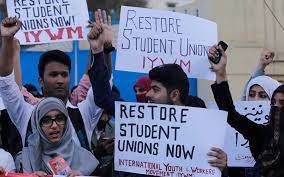
In 1984, student unions were banned by the Ziaul Haq dictatorship. The 1968 movement in Pakistan that later overthrew Ayub Khan was started by student protests. Students faced many problems due to the ban on student unions, and not only students but all institutions in the country suffered.
There are over 58 student organisations in Pakistan, 30 of which are affiliated with political parties, ethnic or religious groups, but have no legal status on campus and are not represented in university administrative decision-making bodies. Universities are academic sanctuaries where the most influential scientists, doctors, engineers, writers, professors and politicians are born.
Although education is the first and main motivation for students to enroll in college, there are many other factors that influence the student's educational process. Most universities in the world also have a Student Union (SU) for student welfare, development and leadership. According to its founding purpose, the student union exists for the welfare of students, but has been criticised for promoting politics, mainly in the education sector.
“There are so many issues that students cannot solve individually, such as admissions, dormitory fees, irresponsible teachers, lack of adequate infrastructure at the university, etc. SU is always there to deal with such issues.” The complete lack of campus politics in Pakistan's leading universities is seen as a boon by many. But given the country's current absence of leadership, one wonders if the lack of student unions at prestigious universities is denying future leaders a foothold.
Political practice and debate are discouraged at all levels in various respected academic organisations across the country. But to prevent such crises, The Sindh law was first proposed in 2019, which saw many student demonstrations calling for the reinstatement of the student union. For two years, the Standing Committee on Legal Affairs, Parliamentary Affairs, and Human Rights of the Sindh Legislative Assembly has held discussions on
planning with all stakeholders, including university rectors, concerned educators, representatives of political parties, and their allied student organisations.
Since the end of Zia-ul-Haq's government in 1988, the lifting of the ban on student unions has been on the electoral platforms of all major political parties, but promises have never been delivered.
In today's Pakistan, it is widely believed that social ills on campus began in 1984 when student unions were banned, leading to problems such as harassment of female students, increased violence on campus, intolerance and radicalisation.
The solution lies in the revival of the student union. Experts say the relocation of Sindh will now make it difficult for other states to further curb this demand from students. Many civil society organizations and members of various political parties expressed solidarity with the protesting students and called on the government to
restore the union.
Other universities have decided to eradicate student unions entirely rather than trying to close loopholes in the system. This action alienated young Pakistani students from the country's leadership scene. We are making
decisions that will affect the fate of millions of Pakistanis.
There are over 58 student organisations in Pakistan, 30 of which are affiliated with political parties, ethnic or religious groups, but have no legal status on campus and are not represented in university administrative decision-making bodies. Universities are academic sanctuaries where the most influential scientists, doctors, engineers, writers, professors and politicians are born.
Although education is the first and main motivation for students to enroll in college, there are many other factors that influence the student's educational process. Most universities in the world also have a Student Union (SU) for student welfare, development and leadership. According to its founding purpose, the student union exists for the welfare of students, but has been criticised for promoting politics, mainly in the education sector.
“There are so many issues that students cannot solve individually, such as admissions, dormitory fees, irresponsible teachers, lack of adequate infrastructure at the university, etc. SU is always there to deal with such issues.” The complete lack of campus politics in Pakistan's leading universities is seen as a boon by many. But given the country's current absence of leadership, one wonders if the lack of student unions at prestigious universities is denying future leaders a foothold.
Political practice and debate are discouraged at all levels in various respected academic organisations across the country. But to prevent such crises, The Sindh law was first proposed in 2019, which saw many student demonstrations calling for the reinstatement of the student union. For two years, the Standing Committee on Legal Affairs, Parliamentary Affairs, and Human Rights of the Sindh Legislative Assembly has held discussions on
planning with all stakeholders, including university rectors, concerned educators, representatives of political parties, and their allied student organisations.
Since the end of Zia-ul-Haq's government in 1988, the lifting of the ban on student unions has been on the electoral platforms of all major political parties, but promises have never been delivered.
In today's Pakistan, it is widely believed that social ills on campus began in 1984 when student unions were banned, leading to problems such as harassment of female students, increased violence on campus, intolerance and radicalisation.
The solution lies in the revival of the student union. Experts say the relocation of Sindh will now make it difficult for other states to further curb this demand from students. Many civil society organizations and members of various political parties expressed solidarity with the protesting students and called on the government to
restore the union.
Other universities have decided to eradicate student unions entirely rather than trying to close loopholes in the system. This action alienated young Pakistani students from the country's leadership scene. We are making
decisions that will affect the fate of millions of Pakistanis.

